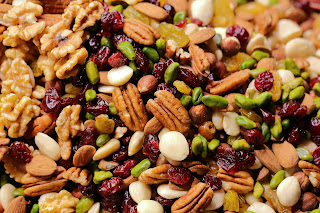How to Increase Hemoglobin Levels Naturally: Best Foods & Practical Tips
Introduction
Blood
is often called the "lifeline" of the body, as it plays a crucial
role in transporting oxygen, nutrients, and hormones to various organs. At the
heart of this process is hemoglobin (Hb), a protein in red blood cells
responsible for carrying oxygen from the lungs to tissues and transporting
carbon dioxide back to the lungs for exhalation. Maintaining optimal hemoglobin
levels is essential for overall health and well-being.
However,
many people struggle with low hemoglobin levels, which can lead to anemia,
fatigue, weakness, and other health complications. In this article, we will
explore:
- What
hemoglobin is and its function
- Symptoms and
causes of low hemoglobin
- Natural ways
to boost hemoglobin levels
- Practical dietary and lifestyle tips to maintain healthy hemoglobin levels
What is Hemoglobin?
Hemoglobin (Hgb or Hb) is an iron-rich protein found in red blood cells. It binds to oxygen in the lungs and carries it to different tissues in the body, ensuring that cells receive the oxygen they need to function properly.
Normal
Hemoglobin Levels
- Men: 14–16 g/dL
- Women: 12–14 g/dL
When
hemoglobin levels drop below these ranges, the body struggles to supply
adequate oxygen to tissues, leading to symptoms such as fatigue, dizziness, and
weakness.
Symptoms
of Low Hemoglobin
A
decrease in hemoglobin levels can lead to several symptoms, including:
- Weakness and
fatigue
- Shortness of
breath
- Dizziness or
lightheadedness
- Irregular or
rapid heartbeat
- Headaches
- Pale or
yellowish skin
- Cold hands
and feet
- Chest pain
in severe cases
If
left untreated, persistently low hemoglobin levels can significantly impact
overall health and quality of life.
Causes
of Low Hemoglobin Levels
Several
factors can contribute to a drop in hemoglobin levels, including:
1.
Blood Loss
- Injuries or
surgeries
- Internal
bleeding (such as
ulcers, colon cancer, or heavy menstrual bleeding)
2.
Nutritional Deficiencies
- Iron
deficiency – Iron is a
key component of hemoglobin, and its deficiency is one of the most common
causes of low levels.
- Vitamin B12
deficiency – Necessary
for red blood cell production.
- Folate
deficiency – Helps in
red blood cell formation.
3.
Bone Marrow Disorders
- Bone marrow
diseases such as leukemia or aplastic anemia can reduce red blood
cell production.
4.
Chronic Illnesses & Medications
- Kidney
disease – The
kidneys produce erythropoietin, a hormone that stimulates red blood cell
production.
- Chemotherapy
drugs – Can suppress bone marrow
function.
5.
Genetic Conditions
- Disorders such as sickle cell anemia and thalassemia can affect the structure and function of hemoglobin.
How
to Increase Hemoglobin Levels Naturally
A
well-balanced diet rich in iron, vitamins, and essential nutrients can
help boost hemoglobin levels. Here are some natural ways to achieve this:
1.
Consume Iron-Rich Foods
Iron
is a crucial component of hemoglobin. Incorporate these iron-rich foods
into your diet:
Top
20 Iron-Rich Foods
1. Drumstick leaves
2. Spinach
3. Beetroot
4. Apple
5. Pomegranate
6. Watermelon
7. Chickpeas
8. Black urad dal
9. Raisins and dates
10.Cashews
11.Almonds (Badam)
12.Walnuts
13.Pistachios
14.Figs
15.Mushrooms
16.Pumpkin seeds
17.Sesame seeds
18.Apricots
19.Sardines & prawns
20.Liver
2.
Increase Vitamin C Intake
Vitamin
C enhances iron absorption. Include foods like:
- Citrus
fruits (oranges, lemons)
- Strawberries
- Bell peppers
- Tomatoes
3.
Add Folate-Rich Foods
Folate
(Vitamin B9) is essential for red blood cell production. Good sources include:
- Leafy greens
(spinach, kale)
- Avocados
- Lentils
- Bananas
4.
Eat Foods Rich in Vitamin B12
Vitamin
B12 helps maintain healthy red blood cells. Sources include:
- Dairy
products
- Eggs
- Fish
- Meat
5.
Stay Hydrated
Water
helps maintain blood volume and allows proper circulation of nutrients,
including iron.
6.
Reduce Iron Blockers
Certain
foods can inhibit iron absorption, such as:
- Excessive
caffeine (tea, coffee)
- High-calcium
foods (avoid consuming calcium-rich foods with iron-rich meals)
7
Practical Tips to Maintain Healthy Hemoglobin Levels
Incorporating
these habits into your daily routine can help sustain healthy hemoglobin
levels:
1. Eat two dates daily.
2. Consume five black or brown raisins per day.
3. Include liver and drumstick leaves in your
diet at least once a week.
4. Snack on nuts daily (almonds, cashews,
walnuts, pistachios).
5. Eat one sesame seed ladoo per day.
6. Include leafy greens at least twice a week.
7. Ensure a daily intake of at least one fruit and one vegetable.
Conclusion
1. Maintaining optimal hemoglobin levels is
essential for overall health,
as it ensures proper oxygen transportation in the body. A deficiency can lead
to fatigue, weakness, and other serious complications.
2. A balanced diet rich in iron, vitamins B12 and C, and folate, along with healthy lifestyle habits, can naturally boost hemoglobin levels. Regularly consuming iron-rich foods and staying hydrated can help prevent anemia and promote well-being.
Let’s Exercise the Word of God Every Day!
"But if we walk in the light, as he is in the light, we have fellowship with one another, and the blood of Jesus, his Son, purifies us from all sin." 1 John 1:7
Leave your Valuable Comments!!!














Praise the LORD!
ReplyDeletePraise the Lord
ReplyDeletevery useful :)
ReplyDeleteWhat a way to give back to the world after all your sufferings..this is such a useful post dear
ReplyDelete